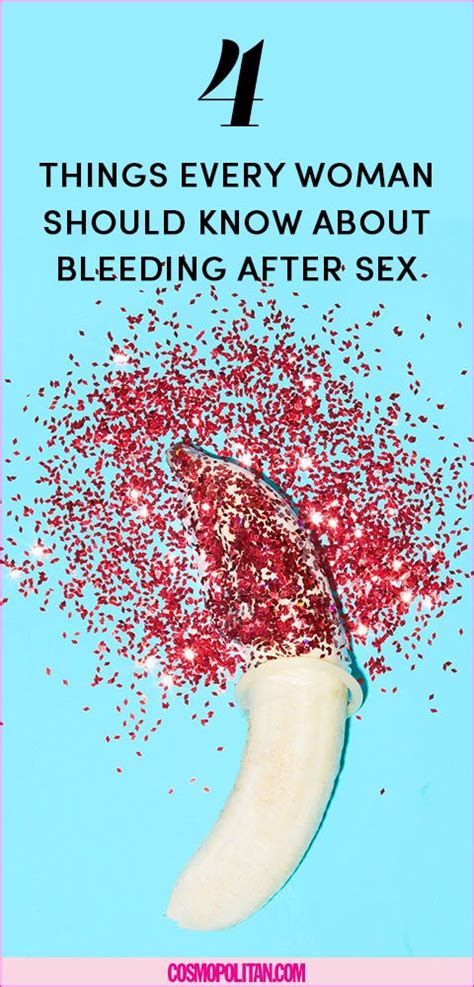Intro
Discover causes and treatments for bleeding after sex, including vaginal bleeding, spotting, and postcoital bleeding, and learn how to manage symptoms and prevent future episodes with expert advice and medical insights.
Bleeding after sex, also known as postcoital bleeding, is a condition that affects many individuals, particularly women. It is characterized by vaginal bleeding that occurs after sexual intercourse. This condition can be caused by a variety of factors, ranging from minor issues to more serious health problems. Understanding the potential causes and symptoms of bleeding after sex is essential for individuals to seek proper medical attention and treatment.
Bleeding after sex can be a source of concern and anxiety for those who experience it. The bleeding can range from light spotting to heavy flow, and it may be accompanied by other symptoms such as pain, discomfort, or unusual discharge. In some cases, the bleeding may be a one-time event, while in other cases, it may be a recurring issue. Regardless of the frequency or severity of the bleeding, it is essential to consult a healthcare provider to determine the underlying cause and receive proper treatment.
The importance of addressing bleeding after sex cannot be overstated. Not only can it be a sign of an underlying health issue, but it can also have a significant impact on an individual's quality of life. The anxiety and stress caused by bleeding after sex can affect a person's self-esteem, relationships, and overall well-being. Furthermore, if left untreated, some underlying causes of bleeding after sex can lead to more serious health complications. Therefore, it is crucial to seek medical attention if you experience bleeding after sex to ensure prompt diagnosis and treatment.
Causes of Bleeding After Sex

There are several potential causes of bleeding after sex. Some of the most common causes include vaginal dryness, cervical polyps, cervical cancer, and pelvic inflammatory disease. Vaginal dryness, also known as vaginal atrophy, is a condition that occurs when the vagina does not produce enough lubrication, leading to dryness and irritation. This can cause bleeding after sex, especially if the dryness is severe. Cervical polyps are growths that occur on the cervix, and they can cause bleeding after sex, as well as other symptoms such as abnormal vaginal discharge.
Cervical cancer is a more serious cause of bleeding after sex. It is a type of cancer that occurs when abnormal cells on the cervix grow and multiply uncontrollably. Bleeding after sex can be a symptom of cervical cancer, especially if it is accompanied by other symptoms such as pelvic pain or unusual vaginal discharge. Pelvic inflammatory disease (PID) is another potential cause of bleeding after sex. PID is a bacterial infection that occurs when bacteria enter the reproductive organs, causing inflammation and infection. This can lead to bleeding after sex, as well as other symptoms such as pelvic pain, fever, and unusual discharge.
Risk Factors for Bleeding After Sex
Other risk factors for bleeding after sex include age, hormonal changes, and certain medical conditions. Women who are postmenopausal or who have a history of cervical cancer or PID are at a higher risk of experiencing bleeding after sex. Hormonal changes, such as those that occur during pregnancy or menopause, can also increase the risk of bleeding after sex. Certain medical conditions, such as endometriosis or uterine fibroids, can also increase the risk of bleeding after sex.Symptoms of Bleeding After Sex

The symptoms of bleeding after sex can vary depending on the underlying cause. Some common symptoms include vaginal bleeding, pelvic pain, and unusual discharge. The bleeding can range from light spotting to heavy flow, and it may be accompanied by other symptoms such as cramping, discomfort, or pain during sex. In some cases, the bleeding may be a one-time event, while in other cases, it may be a recurring issue.
Diagnosis of Bleeding After Sex
Diagnosing the underlying cause of bleeding after sex typically involves a physical exam, medical history, and diagnostic tests. A healthcare provider will perform a physical exam to check for any abnormalities, such as cervical polyps or vaginal dryness. A medical history will also be taken to determine if there are any underlying medical conditions that may be contributing to the bleeding. Diagnostic tests, such as a Pap test or pelvic ultrasound, may also be ordered to help determine the underlying cause of the bleeding.Treatment of Bleeding After Sex

The treatment of bleeding after sex depends on the underlying cause. In some cases, treatment may involve addressing underlying medical conditions, such as cervical polyps or PID. In other cases, treatment may involve lifestyle changes, such as using lubricants during sex or practicing safe sex. In severe cases, treatment may involve surgery or other medical procedures.
Prevention of Bleeding After Sex
Preventing bleeding after sex involves practicing safe sex, using lubricants during sex, and getting regular check-ups with a healthcare provider. Practicing safe sex can help reduce the risk of PID and other sexually transmitted infections that can cause bleeding after sex. Using lubricants during sex can help reduce the risk of vaginal dryness and irritation, which can cause bleeding after sex. Getting regular check-ups with a healthcare provider can help identify any underlying medical conditions that may be contributing to the bleeding.Complications of Bleeding After Sex

If left untreated, bleeding after sex can lead to more serious health complications. For example, if the underlying cause is cervical cancer, it can spread to other parts of the body if left untreated. Similarly, if the underlying cause is PID, it can lead to infertility, chronic pelvic pain, and other complications if left untreated. Therefore, it is essential to seek medical attention if you experience bleeding after sex to ensure prompt diagnosis and treatment.
Emotional and Psychological Impact of Bleeding After Sex
Bleeding after sex can also have a significant emotional and psychological impact on individuals. The anxiety and stress caused by bleeding after sex can affect a person's self-esteem, relationships, and overall well-being. Furthermore, the fear of bleeding after sex can make individuals anxious about having sex, which can lead to intimacy issues and relationship problems. Therefore, it is essential to address the emotional and psychological impact of bleeding after sex, in addition to treating the underlying cause.Seeking Medical Attention

If you experience bleeding after sex, it is essential to seek medical attention. A healthcare provider can help determine the underlying cause of the bleeding and provide proper treatment. In some cases, the bleeding may be a sign of an underlying health issue that requires prompt medical attention. Therefore, do not hesitate to seek medical attention if you experience bleeding after sex.
Conclusion and Next Steps
In conclusion, bleeding after sex is a condition that affects many individuals, particularly women. It is essential to understand the potential causes and symptoms of bleeding after sex, as well as the importance of seeking medical attention. By seeking medical attention, individuals can receive proper diagnosis and treatment, which can help alleviate symptoms and prevent more serious health complications. If you experience bleeding after sex, do not hesitate to seek medical attention. Take the first step towards addressing your symptoms and improving your overall health and well-being.What are the common causes of bleeding after sex?
+The common causes of bleeding after sex include vaginal dryness, cervical polyps, cervical cancer, and pelvic inflammatory disease.
How is bleeding after sex diagnosed?
+Bleeding after sex is diagnosed through a physical exam, medical history, and diagnostic tests such as a Pap test or pelvic ultrasound.
Can bleeding after sex be prevented?
+Yes, bleeding after sex can be prevented by practicing safe sex, using lubricants during sex, and getting regular check-ups with a healthcare provider.
We hope this article has provided you with a comprehensive understanding of bleeding after sex. If you have any further questions or concerns, please do not hesitate to reach out to a healthcare provider. Share this article with others who may be experiencing similar symptoms, and let's work together to promote awareness and understanding of this important health issue.
